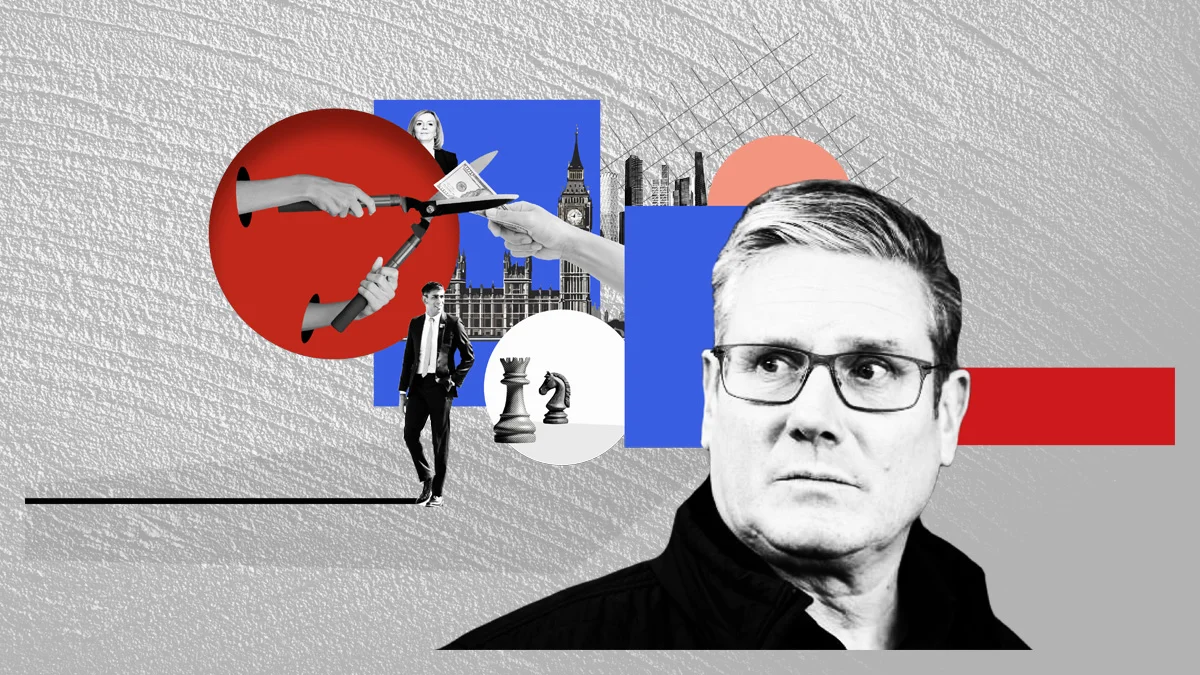
Buckle up. The next seven months are likely to be one of the most expensive, most bitterly contested and longest election campaigns in British history. The state of the polls, with Labour consistently enjoying a 20-point lead, means that the prime minister Rishi Sunak and the Conservatives have little to lose.
Vituperative personal attacks from both sides, relentless Tory psychodrama and an arms race for the support of businesses will become the norm. The run-in to polling day, which No 10 has pencilled in for November 14, will be both brutal and frenetic.
However, strip away the political rhetoric and the election will be won and lost on the economy. After several shifts in his strategy, Sunak has finally alighted on a consistent theme: stick with us and our plan to deliver a brighter future. The Labour leader Sir Keir Starmer, so the Tories’ central argument goes, will take the economy back to “square one”.
The riposte from Labour is straightforward. Over the past 14 years, the Tories have trashed the economy. Energy bills are higher, prices in shops are higher and mortgage repayments have gone through the roof. The time has come for real change. The Conservatives’ hopes for what is an increasingly narrow path to victory rest on a significant improvement in the economic outlook and tax cuts. No 10 and the Treasury believe the economy is heading in the right direction, with inflation poised to fall significantly in the coming months. Cabinet ministers hope the Bank of England will begin cutting interest rates sooner than expected, handing a much-needed tonic to homeowners battling higher mortgage costs.
The Tories are also poised to embark on two rounds of significant tax cuts, the first in the Budget on March 6 and the second in an Autumn Statement on the eve of the election. The focus will be on personal tax cuts, with reductions in the headline rates of income tax and national insurance.
The Tories hope that by the election people will feel better off and more optimistic. The improved economic outlook, so the thinking goes, will be enough to win over undecided voters. Whether Sunak’s optimism survives an impact with reality remains to be seen. Tax cuts, once viewed as a magic bullet, are being met with increasing scepticism by voters. In the last Autumn Statement, chancellor Jeremy Hunt cut national insurance by 2% at a cost of £9bn a year. It failed even to dent the polls.
No 10 and No 11 believe it failed because it was seen as a pre-election “bribe”. The new strategy is to link tax cuts explicitly to economic growth.
However, Labour is deploying what has so far proved to be an effective counter-narrative. Rachel Reeves, the shadow chancellor, has pointed to the fact that under the Conservatives the tax burden is on course to rise to the highest level since the 1950s. Any tax cuts by Hunt will be eclipsed by increased tax revenues from the government’s decision to freeze income tax thresholds. “Rishi’s raw deal”, Labour’s attack advert says. “Pay £10 more tax and get £2 off”.
Arguably the biggest challenge Sunak faces is not Starmer: it is his predecessor, Liz Truss. In the wake of the former prime minister’s disastrous mini-budget, public trust in the Conservatives’ economic competence has tanked. Labour is now seen as consistently more trusted on the economy than the Tories.
The opposition is desperate to guard against complacency. Morgan McSweeney, Starmer’s chief election strategist, once compared the Tories to a killer whale tipping over an iceberg before eating a seal. In his metaphor, unsuspecting Labour MPs were the seal.
However, the party has its own issues to deal with. In November 2021, Reeves committed to spending £28bn a year on green investment if Labour won the election. She would, she said, be Britain’s first “green chancellor”.
That commitment has now been dropped after becoming the Tories’ central attack line. The Tories argued that under Labour’s own fiscal rules, which include debt falling as a proportion of GDP over the next parliament, the pledge could not be met through additional borrowing. Labour, the Tories said, would have no choice but to raise taxes.
Alongside this is a battle for credibility with businesses. Both parties have business councils with an array of household names, and both are attempting to pitch themselves as the party of business. For the Tories, it is a question of rebuilding trust in the wake of Truss’s premiership. For Labour, it is a question of distancing themselves as much as possible from former leader Jeremy Corbyn.
Behind the scenes, this battle has descended into something of an arms race, with both sides fighting it out to win endorsements. At one stage, Hunt intervened directly with business leaders to torpedo Reeves’s shadow business council. It launched a few months later with even more names attached.
There is to date little difference between the economic prospectuses of the two parties. They are broadly aligned on both tax and spending, with Labour supporting cuts to national insurance.
Both sides have also signed up to plans which would see public spending rise by just 1% from 2025, meaning significant cuts to unprotected departments. The Office for Budget Responsibility has described the assumptions underpinning public spending as a “work of fiction”. Economists argue that whoever wins the election will have to either increase taxes or cut public spending.
For Sunak, there is also an existential challenge: whether he will make it to polling day. The prime minister is the subject of an overt plot to oust him, which appears to be well-funded and organised. Two MPs have gone on the record calling for him to go, and MPs believe that a combination of damaging by-election results and disastrous local election results in May could finish him.
The political logic is that Conservative MPs would not be mad enough to remove Sunak and replace him with a fourth Tory prime minister in the space of two years, just months before an election. But as the past four years of feuding and bloody coups have demonstrated, logic does not always prevail.
Steven Swinford is the political editor of The Times.
Related and recommended
Richard Harpin, the founder of HomeServe and Growth Partner and owner of Business Leader, answers your burning business questions
Contestants from The Apprentice reveal the fundamental business lessons they learned from taking part in the TV show
From global talent pools to AI-powered documentation, a work-from-anywhere model is a new way of thinking about productivity, innovation and teamwork
The story of how cycling brought Business Leader member John Readman together with his co-founder and investors




